Developmental Psychology
Aspects of Traumatic Effects Following the
1975 Lebanese Civil War on Christians in
and their Transmission Across Generations
Pierre Khazen
This paper is looking to use the Attachment theory to review intergenerational transmission of the 1975 Lebanese civil war experiences on the Christians of Lebanon and concentrate on survivors of the war and their children born after the war, in 1990. The Attachment theory will try to interpret influences of this war on its survivors and their offspring and concentrate on the long-term influences of the war; it permits the integration of attachment, separation and loss. Insecure-ambivalent-attachment may enlighten on preoccupation with matters of attachment and separation in off springs and survivors of the war. This article concentrates on coping of the war survivors and their offspring and the painful influences of traumatic war experiences and loss of attachment figures; it believes that consequences of the Lebanese civil war on its survivors may vary when using specific methods to investigate influences of the war on its survivors but if using a multi-methodological strategy to investigate, the results may be more accurate and decrease possible difference or contrast between them. When methods of investigation show results, the attachment theory will be used to interpret them and by this unify them so possible problem of this difference is compromised. The assumption is that when each investigation with regard to the issue uses a different method, it may be inevitable that the results are different
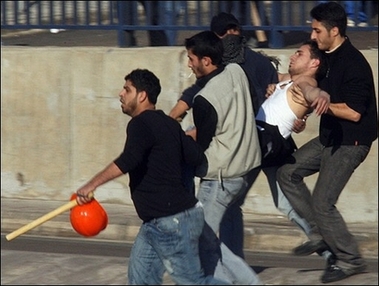 BEIRUT (Reuters) JAN 25 – The death toll in clashes between government loyalists and opposition followers at a Beirut University on Thursday rose to four, an opposition-run television station reported. NBN said two of the dead were students loyal to the opposition, which includes the Shi’ite Muslim Hezbollah and Amal.
BEIRUT (Reuters) JAN 25 – The death toll in clashes between government loyalists and opposition followers at a Beirut University on Thursday rose to four, an opposition-run television station reported. NBN said two of the dead were students loyal to the opposition, which includes the Shi’ite Muslim Hezbollah and Amal.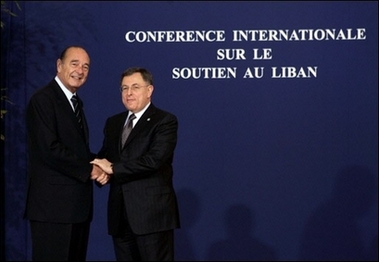 Saudi Arabia, the United States, France, EU and other international donors pledged more than 7.6 billion dollars in aid to Lebanon to support the government. The pledges were made Thursday during a one-day international donors’ conference held in Paris. In his opening speech, Lebanese Prime Minister Fouad Siniora thanked the participants from some 40 countries for their support, and appealed to foreign donors for further financial support, which he said was vital for Lebanon
Saudi Arabia, the United States, France, EU and other international donors pledged more than 7.6 billion dollars in aid to Lebanon to support the government. The pledges were made Thursday during a one-day international donors’ conference held in Paris. In his opening speech, Lebanese Prime Minister Fouad Siniora thanked the participants from some 40 countries for their support, and appealed to foreign donors for further financial support, which he said was vital for Lebanon
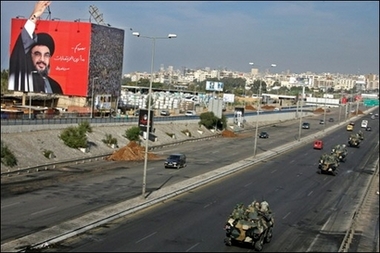 BEIRUT (AFP) JAN 24 – Calm returned to Lebanon as roads were cleared and Beirut airport reopened after the opposition called off a general strike that sparked deadly street fights ahead of a donor conference in Paris. Traffic moved freely Wednesday after tractors and cleaners worked all night to clear tyres, sand and rubble from streets blocked in an opposition show of force on Tuesday aimed at ousting the Western-backed government.
BEIRUT (AFP) JAN 24 – Calm returned to Lebanon as roads were cleared and Beirut airport reopened after the opposition called off a general strike that sparked deadly street fights ahead of a donor conference in Paris. Traffic moved freely Wednesday after tractors and cleaners worked all night to clear tyres, sand and rubble from streets blocked in an opposition show of force on Tuesday aimed at ousting the Western-backed government.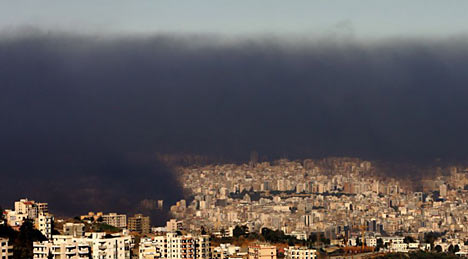 Jan 24, Life was returning to normal in the Lebanese capital and around the country Wednesday, a day after violent confrontation between government supporters and opponents killed three people and wounded dozens. The violence was the worst escalation of the opposition’s campaign to topple Prime Minister Fuad Saniora’s Cabinet.
Jan 24, Life was returning to normal in the Lebanese capital and around the country Wednesday, a day after violent confrontation between government supporters and opponents killed three people and wounded dozens. The violence was the worst escalation of the opposition’s campaign to topple Prime Minister Fuad Saniora’s Cabinet. 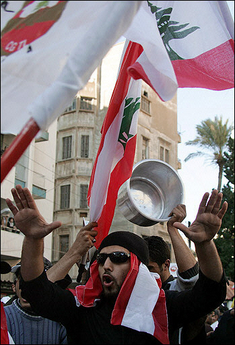 By Tom Perry BEIRUT, Jan 23 (Reuters) – Lebanon’s opposition called on workers to go on strike on Tuesday in an escalation of its campaign against the government that is set to deepen the political crisis in the country. Hezbollah leader Sayyed Hassan Nasrallah, part of the opposition, called on Lebanese to observe the strike and be ready for more steps which the opposition might announce to press its demands for veto power in cabinet and new elections. Prime Minister Fouad Siniora’s has shrugged off the demands, instead preparing for an international aid conference in Paris on Thursday that it hopes will yield billions of dollars for Lebanon’s debt-laden economy.
By Tom Perry BEIRUT, Jan 23 (Reuters) – Lebanon’s opposition called on workers to go on strike on Tuesday in an escalation of its campaign against the government that is set to deepen the political crisis in the country. Hezbollah leader Sayyed Hassan Nasrallah, part of the opposition, called on Lebanese to observe the strike and be ready for more steps which the opposition might announce to press its demands for veto power in cabinet and new elections. Prime Minister Fouad Siniora’s has shrugged off the demands, instead preparing for an international aid conference in Paris on Thursday that it hopes will yield billions of dollars for Lebanon’s debt-laden economy. 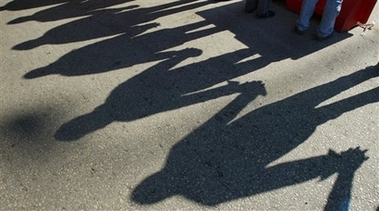 Beirut, Jan 14 (DPA) The slogan ‘I love life’ is currently covering billboards around the Lebanese capital as the government and the opposition compete over who loves life and Lebanon more. It is a campaign used by the March 14 Coalition and has been countered by slogans from the opposition that read: ‘We love life without debt or outside interferences.’The billboards represent the competition between Lebanon’s government and its allies, and the opposition to show their love for Lebanon.’We love life with pride,’ reads a billboard for the Lebanese Shia movement Hezbollah. A few metres away, a large billboard pasted up by the forces that support the government of Premier Fouad Seniora says: ‘We want to live. We love life.’
Beirut, Jan 14 (DPA) The slogan ‘I love life’ is currently covering billboards around the Lebanese capital as the government and the opposition compete over who loves life and Lebanon more. It is a campaign used by the March 14 Coalition and has been countered by slogans from the opposition that read: ‘We love life without debt or outside interferences.’The billboards represent the competition between Lebanon’s government and its allies, and the opposition to show their love for Lebanon.’We love life with pride,’ reads a billboard for the Lebanese Shia movement Hezbollah. A few metres away, a large billboard pasted up by the forces that support the government of Premier Fouad Seniora says: ‘We want to live. We love life.’


